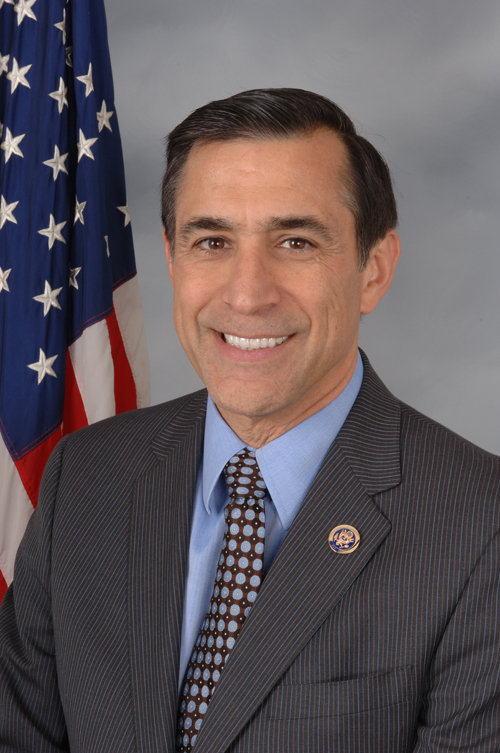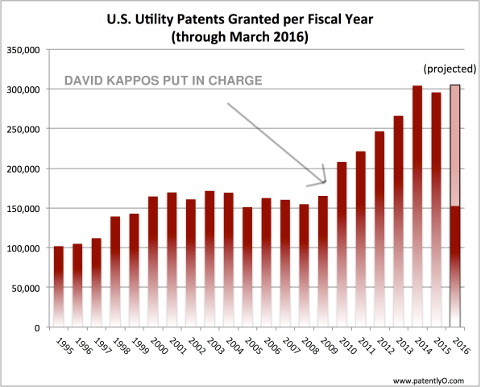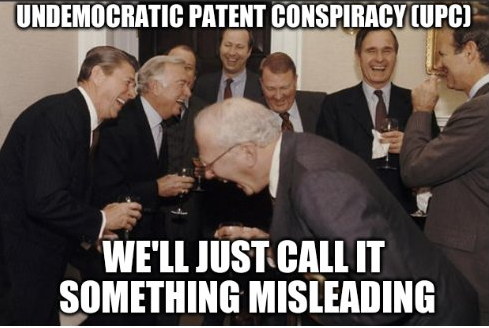04.24.16
Posted in America, Patents at 5:11 am by Dr. Roy Schestowitz
English/Original
Article as ODF
Publicado en America, Patentes at 6:17 am por el Dr. Roy Schestowitz

Sumario: El Sr. Darrell Issa (fotografiado arriba) cae bajo ataque de los proponentes de patentes de software patents, los apologistas de los trolles de patentes (quiénes los financian frecuéntemente), y los máximalistas de patentes porque correctamente insinuó que la (mayoría) de demandantes son como/casi trolles de patentes en los Estados Unidos
En los EE.UU, la mayoría de demandantes son trolles de patentes. Los mismos que usan patentes de software que serían declaradas inválidas en caso de que sean llevadas a corte. No se puede negar, simplemente miren a las ampliamente al alcanze estadísticas que lo demuestran y luego consideren el dinero extraído fuera de las cortes (como ‘dinero de protección’) y sin que los medios de comunicación se enteren (secretividad es demandada conjuntamente por el extorsiónador: si abres la boca, te jodes). La USPTO continúa otorgandoel doble de patentes de las que otorgaba hace una década. Parece no haber un control de calidad, por lo menos unefectivo control de calidad (92% of aplicaciones terminan siendo aceptadas). Estasnuevos números de Patently-O, que cubren una clase particular de patentes, refuerza esta noción. Completamente reafirman o se acomodan al modelo y comoIP Kat lo ha puesto, “el sistema de patentes es incapaz de incentivar la innovación, en un tiempo en que esta (la innovación) esta en decline.”
“Estos trolles de patentes usan patentes de software que serían declaradas inválidas si fuesen traídas ante las cortes.”
El sistema de patentes de los EE.UU. esta ahora dominado más por parásitos que innovadores. Es un problema real. Pero aquellos que insinuen esto o se ‘atrevan’ a señalarlo vienen siendo objeto de ataques severos, especialmente si ellos tienen o son de gran influencia. El bocón Gene Quinn (a quién hemos llamado WatchTroll por varias razones) guía a la jauría en estos ataques.
“El Congresista Issa llama a los trolles de patentes y a los acusadores lo mismo durante una audiencia del ITC,” escribió en Twitter, uniéndolo a un artículo con el mismo titular. La totalidad de este artículo esta basado en una pequeña parte de su discurso que dijo, “por propósito de mi declaración inicial ‘acusador’ y ‘troll’ serán intercambiables.”
Esto es un marco conveniente para abreviar cuando el tiempo es limitado (e.g. en una audiencia), pero vean cuán lejos Quinn llevó todo esto, defendiéndo las políticas de embargo de la ITC así como defender a los trolles de patentes al atacar a Darrell Issa, es decir, al mensajero. Estos son los esperados ataques personales contra él de parte de Quinn (de ‘hipocresía’), de la misma manera que atacó a Mark Cuban (por la inversión Vringo), que está tratando de demoler las patentes de software.
“El sistema de patentes de los EE.UU. esta ahora dominado más por parásitos que innovadores.”
“Finalmente llegamos a la ´verdad´,” escribió IAM (al alabar a Gene Quinn revela a quienes IAM representa). “De acuerdo a los proponetes de una reforma un troll de patentes es cualquier entidad que busca el enforzamiénto/obligación de una patente” (porque para los máximalistas de patentes, sus propagandistas, y los proponentes de ellas tienen una agenda en común, la que incluye a los más acérrimos enforcers/interesados en patentes de software patents, llamelos trolles de patentes).
Pronto se uniría a lo de arriba un empleado de Bristows [1, 2] (UPC y software proponente de patentes) quien escribió: El SubComité es subdirigido por el CongresistaDarrell Issa (R-CA), quien ha estado abogando abiertamente por la necesidad de una reforma de patentes para proveer alivio en contra de aquellos que el cree estan sacando ventaja del sistema de litigación de patentes — aquellos a veces llamados trolles de patentes. Ciertamente, desde el comienzo de al audiencia el Jueves, el debate acerca de la infracción de patentes en la ITC fue enfatizado en el lenguajo del debate acerca del troll de patentes. Por ejemplo, el Congresista Issa dijo, por propósito de mi declaración inicial ‘acusador’ y ‘troll’ serán intercambiables.”
“Existe una agenda para incluírexclusivamentepalabras que convienen a los antagonistas es una herramienta de uso común.”
La estrategia de nitpicking una breve declaración (donde se logró la brevedad de la manera indicada anteriormente) es bastante común en estos días. Existe una agenda para incluír exclusivamente palabras que convienen a los antagonistas es una herramienta de uso común. Frecuéntemente lo vemos online para incitar en contra de Techrights (representando mal nuestros puntos de vista).
Incídentalmente y no sorprendió (era inevitable), ‘la revista’ IAM se une al nefasto cabildero David Kappos (financiado por la Sagrada Familia: IBM, Microsoft, Apple, etc.) en su ataque a los desafíos a las patentes de software en los EE.UU.. Para citar un artículo de este fin de semana (insistiendo en que “algo hay que hacer al respecto [sección] 101″:
A principios de esta semana, elex Director de la USPTO David Kappos dobló su continuo ataque a la jurisprudencia reciente y pidió la abolición de 101. En su intervención en la Conferencia Circuito Judicial de la Federación, según los informes comparó la situación en los EE.UU. con Europa y Asia. “Es hora de abolir la Sección 101 y la razón por la que digo esto es que Europa no tiene 101 y Asia no tienen 101 y parece que están haciendo muy bien en la limitación de patente materia susceptible”, comentó.
Tal es la incertidumbre en torno a 101 tanto en el campo de la biotecnología y alta tecnología, gracias a las decisiones del Tribunal Supremo en una serie de casos, incluyendo Alice Corp v CLS Bank y Mayo v Prometeo, que las preocupaciones de Kappos son compartidos por muchos propietarios de patentes. Sus preocupaciones alrededor de 101 han evolucionado en los últimos años. En un panel en la conferencia anual de la AIPLA en 2014 afirmó que la jurisprudencia había movido mucho más allá del significado original de la ley. Se reforzó sus argumentos en un discurso que pronunció en el evento de liderazgo en 2015 cuando señaló que a pesar de la incertidumbre, 101 la reforma no figuraba en los debates en torno a la legislación sobre patentes.
IAM es vocero de los abogados de patente, grandes multinacionales que se apoyan/sacan ganacia de las patentes de software (esparciéndo su dominación sobre el resto del mundo), quienes son básicamente los que financian a IAM. Son sus mecenas (y esta obligado a seguir lamiéndoles el trásero).Un altavoz por aquellos intereses es lo que IAM se ha convertido. No es un sitio de noticias. Es toda una agenda disfrazada de ‘noticias’.
Permalink
 Send this to a friend
Send this to a friend
04.23.16
Posted in America, EFF, Patents at 8:40 am by Dr. Roy Schestowitz
By taking on the Lexmark case the EFF works towards printing/ink/toner rights in general

Summary: A look at some of the latest activity of the EFF in the area of patents, where there probably ought to be increased emphasis on the harms of software patents and need for elimination thereof
THE Electronic Frontier Foundation is a potential ally in the fight against software patents. We have written about its role in the battle for nearly a decade now (Novell paid the EFF almost one decade ago) and we continue to monitor its progress. Funded by Mark Cuban to do this kind of activism (Cuban, who reads Techrights, is notably against software patents), we believe that a lot of good can come out of what the EFF does.
The EFF’s Julie Samuels wrote 4 days ago that she’s still fighting “Against Stupid Patents” (not too useful to choose the word “stupid” for one who fights against software patents). “Despite the program’s modest but important success at weeding out some of the worst patents,” she wrote, “it’s under attack from those who oppose patent reform and apparently believe a 20-year government monopoly should not have to withstand any scrutiny. Specifically, representatives from certain industries (e.g., the pharmaceutical and biotechnology industries) claim that IPRs are “patent death squads” and have been hard at work on Capitol Hill trying to roll back the program’s effectiveness by dulling its procedures.”
“The EFF basically gets involved in the Lexmark patent case (trying to drag in the Supreme Court) and is attracting/receiving supportive press coverage.”We wrote about the use of the term “patent death squads” in the past, e.g. in [1, 2, 3, 4]. They use other malicious-sounding terms to describe invalidation of bogus patents and they use euphemisms for their own abuses.
The EFF’s latest battle seems to be tackling a subject which we wrote about some weeks ago [EN | ES]. The EFF basically gets involved in the Lexmark patent case (trying to drag in the Supreme Court) and is attracting/receiving supportive press coverage. Public Knowledge wrote earlier this week: “Yesterday, Public Knowledge filed an amicus curiae brief with the Supreme Court in the case Impression Products v. Lexmark International. The brief was joined by the Electronic Frontier Foundation and the R Street Institute.
“The case relates to printer toner cartridges that are refilled and resold. Lexmark argues that the resale of printer cartridges violates its patent rights. Impression Products, who remanufactures cartridges, contends that its activities are legally permitted because Lexmark’s patent rights were exhausted at the time of sale of the cartridges to consumers. The amicus brief filed supports Impression’s view that consumer ownership rights should override Lexmark’s patent interests.”
“Cory Doctorow’s headline said “Printer ink wars may make private property the exclusive domain of corporations” and here is the EFF’s own humble statement (“EFF Asks Supreme Court to Overturn Dangerous Ruling Allowing Patent Owners to Undermine Ownership”).”This was also covered by WIPR, which wrote: “The Electronic Frontier Foundation (EFF) has urged the US Supreme Court to hear and overturn a “troubling decision” handed down by an appeals court that centres on patent exhaustion.”
Cory Doctorow’s headline said “Printer ink wars may make private property the exclusive domain of corporations” and here is the EFF’s own humble statement (“EFF Asks Supreme Court to Overturn Dangerous Ruling Allowing Patent Owners to Undermine Ownership”).
To quote the EFF: “The case is called Impression Products, Inc. v. Lexmark International, Inc. and it concerns the arcane but important question of patent exhaustion. This is patent law’s version of “first sale,” the doctrine in copyright law that says that once a consumer buys a copy of a work, she owns it and can do what she wants with that copy. Patent law is similar. Once a patent owner sells a product, it cannot later claim that that product’s use or sale is infringing.”
“We have been critical (at times) of the EFF’s approach, but all in all, what the EFF is doing is better than nothing at all.”At the same time the EFF fights for another cause (“Court Confirms EFF Can Stand Up for Public Access to Court Records”).
“Last month,” it explained, “EFF moved to intervene in a patent case in order to unseal records we believe have been improperly kept from the public. Yesterday, the court granted EFF’s motion to intervene, and in doing so, rejected a troubling argument being put forth by the patent owner.
“The case is Blue Spike v. Audible Magic. As we noted in our blog post last month, numerous documents, including at least three court opinions, have been completely withheld from the public. The sealed documents are highly substantive, and from what we can gather, would help the public better understand what, exactly, Blue Spike claims to have invented.”
We have been critical (at times) of the EFF’s approach, but all in all, what the EFF is doing is better than nothing at all. We just wish it did more to directly tackle software patents in the US, especially now that a lot of patent giants lobby the government (more on that later today). █
Permalink
 Send this to a friend
Send this to a friend
Posted in Asia, Patents at 7:45 am by Dr. Roy Schestowitz
RCEP threatens to hamper (software) development in India

India Gate
Summary: The creeping threat of another so-called ‘trade’ deal whose impact favours monopolies against the interests on Indians and must thus be rejected by Indians
THE Regional Comprehensive Economic Partnership (RCEP) has been mentioned alongside the TPP recently. For a little information about what makes it so controversial see the press release titled “MSF Concerned About New Threat to Affordable Medicines in Trade Negotiations with India and ASEAN” among several others, including media reports [1, 2, 3, 4, 5, 6, 7, 8, 9, 10]. It has all the elements of a corporations-led ‘trade’ deal, where large multi-national corporations pile up their wishlists and try to make their selfish desires multi-national laws, all in one fell swoop, usually after negotiations behind closed doors and sometimes bribery of politicians (see the incidents in Japan for example).
“It has all the elements of a corporations-led ‘trade’ deal, where large multi-national corporations pile up their wishlists and try to make their selfish desires multi-national laws, all in one fell swoop, usually after negotiations behind closed doors and sometimes bribery of politicians (see the incidents in Japan for example).”One interesting element of the coverage about RCEP is the “TRIPS plus provisions”. RCEP shows that India too is affected by this whole patent coup, where the national interests of India are undermined in secret (as the public would be furious if the proceedings were known). An even more interesting tidbit is brought up in relation to unions [1, 2] and next week there will be a resumption of the talks in Australia (this corporate takeover of the world seems to be Anglo-Saxon-leaning).
Given India’s rules on software patents, which resemble somewhat the EPO‘s, one must watch out for the impact on software patenting. As the Economic Times put it yesterday, “RCEP talks could affect startups by allowing patenting of computer software” and to quote the author:
The ongoing Regional Comprehensive Economic Partnership (RCEP), a mega trade agreement being negotiated between 16 countries including India, could have an adverse impact on the startup and technology services industries, if a clause on software patents is allowed to pass.
“The proposed clause in the Free Trade Agreement being negotiated could result in floodgates being opened for patents in the field of software,” Software Freedom Law Centre said in a letter to the Commerce Secretary, dated April 18.
“This will make writing code and innovating in the field of software a risky proposition akin to stepping on a minefield, with the developer unaware of when he could be accidentally infringing on a patent. This could also hinder the success of the ‘Digital India’ programme and hurt the domestic software/IT industry as well as the ‘Make in India’ initiative,” it further adds.
This quotes Software Freedom Law Centre (SFLC), which previously did some fine work in India ahead of the rejection (again) of software patents.
We encourage readers who are in India to put pressure against RCEP ahead of next week’s meeting. There is a lot at stake here and lobbyists for software patents never grow tired, no matter how many times they get defeated. █
Permalink
 Send this to a friend
Send this to a friend
Posted in America, Asia, Courtroom, GNU/Linux, Google, Patents at 6:37 am by Dr. Roy Schestowitz
English/Original
Article as ODF
Publicado en America, Asia, Courtroom, GNU/Linux, Google, Patents at 8:05 am por el Dr. Roy Schestowitz

Sumario: A pesar de amasar muchas patentes por diseño propias, Samsung quiere voluntáriamente interceptarlas/socavarlas cada una de ellas, en order de acabar con las demandas de Apple contra Android/Linux
LA Oficina de Patentes de los EE.UU. la USPTO, continua otorgando patentes por diseño, las que son a su vez controversiales en Europa.
Una escala/numero de patents por diseño acaban de ser presentadas por Patently-O, las que dice: “Las patentes de diseño siguen siendo un esquema de protección popular para los desarrolladores de productos de consumo y pantallas. Los diez más concesionarios por lo tanto, mucho de 2016 con la mayoría de los ejemplos recientes …”
“Samsung no ha (históricamente por lo menos) sido agresivo con patentes.”
Con Samsung en la cumbre, luego LGE (a quién Apple frecuéntemente acusó de plagio — en diseños— cuando primero introduco su iPhone). Ambas son compañías Coreanas y un comentari corréctamente señala: “Uno no podría ser sorprendidos al notar que Samsung es altamente conscientes de las propiedades potentes de patentes de diseño.” Actualmente Samsung desafía la potencia de este tipo de patentes, tomando todo el camino hasta la Corte Suprema. En todo caso, esto puede indicar que Samsung solamente a regañadientes patenta diseños, tal vez con la esperanza de nivelar estos fines defensivos cuando compañías como Apple los ataca (con connotaciones nucleares). Samsung no ha (históricamente por lo menos) sido agresivo con patentes.
“Una decisión del Circuito Federal ha puesto a Coleman Co en una posición más fuerte para enjuiciar a un competidor por infringimiento de sus patentes de diseño relacionado a aparatos personales de flotación.”
–Bloomberg BNA
Harness, Dickey & Pierce, PLC, una firma de abogados (obviamente), acaba de publicar este artículo acerca de patents por diseño de construcción como números acerca de patentes por diseño sugieren un rápido incremento en medio de un caso que SCOTUS trajo en su contra. Como hemos explicado aquí unas pocas veces antes, muchas patentes por diseño son similares y relacionadas con las patentes de software (interfaces en particular). Su existencia es desafíada en las cortes de nuevo, como este artículo sirve para mostrar. Parece una vez más que la CAFC decide en la materia. Para citar:Recuérden que el propósito original del sistema de patetnes fue proveer un incentivo para su publicación a cambio de un monopolio temporario. A la luz de aquella premisa olvidada por mucho tiempo consideren este nuevo post de Patently-O que dice: Una decisión del Circuito Federal ha puesto a Coleman Co en una posición más fuerte para enjuiciar a un competidor por infringimiento de sus patentes de diseño relacionado a aparatos personales de flotación.
La suerte de las patentes por diseño tiene billónes en riesgo; no sólo billones de dólares/pounds/yens pero también billones de personas.
Permalink
 Send this to a friend
Send this to a friend
Posted in America, Patents at 6:32 am by Dr. Roy Schestowitz
English/Original
Article as ODF
Publicado en America, Patentes at 8:38 am por el Dr. Roy Schestowitz

Credito: Patently-O (pero anotado)
Sumario: Una mirada a la expansión de la esfera de patentes (y permisividad) el los Estados Unidos y lo que realmente puede ser deducido de ella
Una firma de explotación de patentes, Mintz Levin Cohn Ferris Glovsky y Popeo PC, acaba de escribir acerca de “Utilidad de lal Aplicación por Patentes” — materia que tocamos no hace mucho por figuras publicadas porPatently-O.
“No hay mucha innovación en esta materia, pero un montón más de patentes cada año (ver el gráfico de arriba), así que uno correctamente puede sospechar que existe una burbuja en fabricación.”
“En casi todas las demandas de patentes en los EE.UU.”, dijo la firma de abogados, “el abogado del titular de la patente considera la forma en que el caso podría haber sido facilitada mejor si la patente en cuestión hubiera sido redactada y tramitada de manera diferente. Estas consideraciones demuestran que las patentes deben ser elaboradass y procesadas con vista hacia la posibilidad de un litigio. Ha habido varias decisiones importantes en los casos de patentes que impactan directamente la tramitación de patentes. Este artículo analiza algunas de esas decisiones en orden cronológico para proporcionar sugerencias para un fiscal en la redacción de la patente o el procesamiento de una solicitud de patente”.
Patently-O, mientras tanto, continua escribiéndo acerca de esas patentes y dice: “El siguiente gráfico muestra el número de solicitudes de patentes UPR presentadas en los últimos años fiscales (que se ejecutan 1 de octubre al 30 de septiembre), junto con una simple proyección de las aplicaciones para el año fiscal 2016. La gran mayoría de estos son solicitudes de patentes de utilidad”.
No hay mucha innovación en esta materia, pero un montón más de patentes cada año (ver el gráfico de arriba), así que uno correctamente puede sospechar que existe una burbuja en fabricación. ¿Cuán bueno es un sistema de patentes como la USPTO si hay un inexistente o poquísimo control de calidad? Esta falta de calidad es por eso que muchas empresas terminaron viendo sus patentes de software devaluados después de la decisión Alice, la que afirmó correctamente que muchas patentes de software son abstractas y por lo tanto deben ser considerados válidas. Lo mismo podría decirse de la crisis financiera causada por la falta de control de calidad o indulgentes criterios de holgura (sin rigidez) cuando se trata de hipotecas.
“Recuérden que el propósito original del sistema de patetnes fue proveer un incentivo para su publicación a cambio de un monopolio temporario.”
Considereneste nuevo comentario de Nicola Searle quien dijo “Mi cerebro empezó a gritar cuando vi” las patentes como un vehículo para la innovación “¿WTF?”
Seguro que molestó a la horda de abogados de patentes, quienes desearían creer que a más aplicaciones por patentes (o más juicios), mejor para ellos y más innovadora la sociedad se volverá.
Recuérden que el propósito original del sistema de patetnes fue proveer un incentivo para su publicación a cambio de un monopolio temporario. A la luz de aquella premisa olvidada por mucho tiempo consideren este nuevo post de Patently-O que dice:
“Hasta ahora, en 2016, la USPTO ha emitido tres patentes que reivindican prioridad pre-GATT. Estos tres son derechos adquiridos en virtud de la duración de la patente de edad de 17 años de de-emisión, ya que se presentaron antes del 8 de junio de 1995.”
“Seguro que molestó a la horda de abogados de patentes, quienes desearían creer que a más aplicaciones por patentes (o más juicios), mejor para ellosy más innovadora la sociedad se volverá.”
Para dar un ejemplo, vean una patente que fue “presentada en 1973, pero que en virtud de una orden se mantuvo en secreto hasta el año 2010.”
Pues bien, las patentes eran sobre PUBLICACIÓN original. Si ni siquiera están siendo publicados por tantos años, ¿cómo se supone que pensar en la USPTO como un intento de maximizar la innovación (en oposición a maximizar el número de patentes concedidas)?
China, como los EE.UU. (SIPO como la nefasta USPTO), ha bajado la calida de patentes y ahora eso otra Texas con su caos de litigios, basado en aquellos que aman los juicios de patentes (IAM ‘magazine’). Uno sólo puede esperar que Battistelli no se salga con la suya en la EPO y cause daño similar o PEOR en Europa, e.g. con la UPC. Más de ello en nuestro próximo post…
Permalink
 Send this to a friend
Send this to a friend
Posted in Europe, Law, Patents at 6:26 am by Dr. Roy Schestowitz
English/Original
Article as ODF
Publicado en Europe, Law, Patentes at 9:08 a.m. por el Dr. Roy Schestowitz

Sumario: Una discusión acerca de las últimas amenazas a los desarrolladores de software en Europa, notablemente la expansión de patentes de software (cuidado con la UPC), los llamados ‘secretos de comercio’, y no simplemente derechos de autor (o copyleft) que son las únicas cosas que los desarrolladores necesitan
Temprano este año mostramos quien estaba cabildeando por la UPC en el Reino Unido (no sorprende queaquellos que la apoyan son los que se benefician de las litigaciones) y también mostramos alguna disonancia cognitiva. Algunos nos quieren hacer creer que la UPC vendrá al Reino Unido irrespectivamente de Brexit.
Brexit definitivamente socavaría a la UPC, dicen los proponentes de la UPC. Para citar: “Dependiendo de su resultado es el inmediato – talvez el permanente – futuro de la Corte Unitaria de Patentes (UPC) de la EU.”
“Algunos nos quieren hacer creer que la UPC vendrá al Reino Unido irrespectivamente de Brexit.”
La EPO pueda pensar que es muy bueno promoverpatentes de software en Europay tambien promover la UPC (lo que les ayuda a traerla a cada país de Europa), pero no será tan fácil como espera. Todavía es incierto si la UPC se materializará después de todo.
En su primera parte, IP Kataludió a materias dela patentabilidad del “diseño de interface del usuario” (relacionado con las patentes de software) y enesta segunda partese enfoca en “el apróximamineto Alemán” en vez de “el aproximamiento de la EPO” (el último es menos permisible). Otronuevo artículo de IP Kat correctamente señala que: “En los Estados Unidos elementos de software han sido tradicionalmente protegido por patentes, derechos de autor y secretos comerciales.”
“En términos generales, todos los desarrolladores de software (ya sea software libre o proprietario) deberían estar más preocupados por los esfuerzos para aprobar más y más leyes que pretenden “proteger”, pero en realidad sólo penalizan más y más aspectos del desarrollo de software.”
Pues bien, el software ya está protegido contra copias/plagiospor la ley de derechos de autor. Las patentes no son en absoluto ser necesarias y legislación sobre secretos comerciales es totalmente innecesaria para la mayoría de los propósitos. Se trata de la mera comunicación de las ideas como “propiedad”. El artículo también dice: “La protección proporcionada por la superposición de múltiples disciplinas de la propiedad intelectual sobre el software es relativamente rutinario. Sin embargo, la ley federal preventiva de derechos de autor sobre los derechos de autor esencialmente bloquea un estado de superposición reivindicación -a veces puede adelantarse a una demanda secreto comercial que cubre el software. En la medida existe duda persistente sobre los derechos de autor de preferencia de las reivindicaciones secretos comerciales que cubren el software, federalizar una causa de acción privada para el comercio apropiación indebida de secretos a través de los secretos comerciales elimina cualquier duda que pudiera quedar. “
Esto básicamente habla de paradigmas de software propietario donde hay presunción de código secreto. En términos generales, todos los desarrolladores de software (ya sea software libre o proprietario) deberían estar más preocupados por los esfuerzos para aprobar más y más leyes que pretenden “proteger”, pero en realidad sólo penalizan más y más aspectos del desarrollo de software. ¿Pero para beneficio de quién?
Permalink
 Send this to a friend
Send this to a friend
04.22.16
Posted in Europe, Law, Patents at 9:08 am by Dr. Roy Schestowitz

Summary: A discussion about the latest threats to software developers in Europe, notably the expansion of patents to software (watch out for UPC), so-called ‘trade secrets’, and not just copyrights (or copyleft) that are the only thing programmers really need
EARLIER this year we showed who was lobbying for the UPC inside the UK (not surprisingly, those who stand to benefit from litigation) and also showed some cognitive dissonance. Some want us to believe that the UPC will come to the UK irrespective of Brexit.
Brexit would definitely undermine the UPC, say UPC proponents. To quote: “Hinging on the result is the immediate – and perhaps permanent – future of the EU unitary patent and Unified Patent Court (UPC).”
“Some want us to believe that the UPC will come to the UK irrespective of Brexit.”The EPO may think that it’s alright to promote software patents in Europe and to also promote the UPC (which helps bring them to every European country), but it won’t be as easy as it hopes. It’s certainly still an uncertainty whether or not UPC will ever become a reality at all.
In its first part, IP Kat alluded to matters of “user interface designs” patentability (related to software patents) and in this second part it focuses on “the German approach” rather than “the EPO approach” (the latter is less permissive). Another new article from IP Kat correctly points out that: “In the United States elements of software have traditionally been protected by patent law, copyright law and trade secret law.”
“Generally speaking, every software developer (whether FOSS or proprietary) should be deeply concerned about efforts to pass more and more laws which purport to ‘protect’ but actually just criminalise more and more aspects of software development.”Well, software is already protected from copying/plagiarism owing to copyright law. Patents should not at all be necessary and trade secret law is totally unnecessary for most purposes. It treats mere communication of ideas as “property”. The article also says: “The overlapping protection provided by multiple disciplines of intellectual property over software is relatively routine. However, copyright preemption–federal copyright law essentially blocking an overlapping state claim–can sometimes preempt a trade secret claim covering software. To the extent there is lingering doubt about copyright preemption of trade secret claims covering software, federalizing a private cause of action for trade secret misappropriation through the Defend Trade Secrets Act likely removes any remaining doubt.”
This basically speaks of proprietary software paradigms where there’s presumption of code secrecy. Generally speaking, every software developer (whether FOSS or proprietary) should be deeply concerned about efforts to pass more and more laws which purport to ‘protect’ but actually just criminalise more and more aspects of software development. To whose benefit? █
Permalink
 Send this to a friend
Send this to a friend
Posted in America, Patents at 8:38 am by Dr. Roy Schestowitz
USPTO patent quality has become farcical since David Kappos (IBM) became its Director

Credit: Patently-O (but annotated)
Summary: A look at the expansion of patent scope (and permissiveness) in the United States and what can really be deduced from that
A patents exploitation firm, Mintz Levin Cohn Ferris Glovsky and Popeo PC, has just written about “Utility Patent Applications” — a subject we touched here some days ago because of figures released by Patently-O.
“There is not much more innovation in this domain, but a lot more patents each year (see the chart above), so one might rightly suspect there’s a bubble in the making.”“In almost every U.S. patent suit,” said the law firm, “the patentee’s counsel considers how the case could have been facilitated had the patent at issue been drafted and prosecuted differently. These considerations demonstrate that patents should be drafted and prosecuted with an eye toward the possibility of litigation. There have been several landmark decisions in patent cases that directly impact patent prosecution. This article analyzes some of those decisions in chronological order to provide suggestions for a patent prosecutor in drafting or prosecuting a patent application.”
Patently-O, in the mean time, continues to write about such patents and says: “The below graph shows the number of UPR patent applications filed over the past several fiscal years (which run from October 1 to September 30), along with a simple projection of the applications for FY 2016. The vast majority of these are utility patent applications.”
There is not much more innovation in this domain, but a lot more patents each year (see the chart above), so one might rightly suspect there’s a bubble in the making. What good is a patent system like the USPTO if there's little or virtually no quality control? This lack of quality is why many firms ended up seeing their software patents devalued after the decision on Alice, which correctly asserted that many software patents are abstract and should thus be deemed invalid. The same could be said about the financial crisis caused by lack of quality control or slack/lenient criteria (no rigidness) when it comes to mortgages.
“Remember that the original purpose of the patent system was to provide an incentive for publication in exchange for a temporary monopoly.”Consider this new comment from Nicola Searle who said “my brain started screaming when I saw “patents as a proxy for innovation.””
It sure angered the crowd of patent lawyers, who wish to believe that the more patents get filed (or more lawsuits), the better off and more innovative society will become.
Remember that the original purpose of the patent system was to provide an incentive for publication in exchange for a temporary monopoly. In light of that long-forgotten premise consider this new post from Patently-O that says: “So far in 2016, the USPTO has issued three patents that claim priority pre-GATT. These three are grandfathered in under the old 17-year-from-issuance patent term because they were filed before June 8, 1995.”
“It sure angered the crowd of patent lawyers, who wish to believe that the more patents get filed (or more lawsuits), the better off and more innovative society will become.”To give one example, see one patent which was “filed in 1973 but was held under a secrecy order until 2010.”
Well, patents were about PUBLICATION originally. If they’re not even being published for so many years, how is one supposed to think of the USPTO as seeking to maximise innovation (as opposed to maximising the number of granted patents)?
China, like the US (SIPO like USPTO), has lowered patent quality and now it’s another Texas with a litigation mess, based on those who love patent lawsuits (IAM ‘magazine’). One can only hope that Battistelli won’t get his way at the EPO and cause similar damage inside Europe, e.g. with the UPC. More on that in our next post… █
Permalink
 Send this to a friend
Send this to a friend
« Previous Page — « Previous entries « Previous Page · Next Page » Next entries » — Next Page »























 Content is available under CC-BY-SA
Content is available under CC-BY-SA